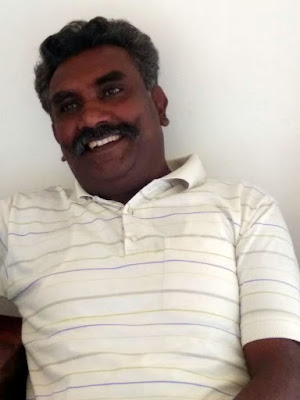by Minoo Avari
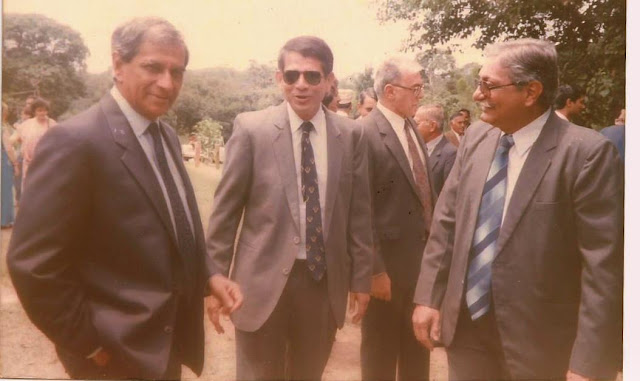 |
My ex-Bombay Burmah colleagues: Late
Ricky Muthanna, Subbu (his nephew), Late Nickoo Rawley and Late Dinshah
Daruvalla, when we met up in Coorg for a reunion. They are all well known in planting circles in South India.
|
"You will have to meet the Brake Inspector," the Motor Vehicle Inspector said, pointing to the room across the corridor from his office.
I had waited two hours to meet the Motor Vehicles Inspector at his office in Palani. There was a huge crowd around his desk. When it finally came to my turn, I was told to meet the Brake Inspector! There were snide chuckles from the battery of people who had come, with cash in hand, to have their new vehicles registered. I got up to leave and was shoved aside by a ruffian who had come to have his commercial vehicle inspected. I found out later he was the self-appointed leader for a group of local van owners.
The scene at the Brake Inspector’s office was no better. Thronging with humanity, I couldn’t get anywhere near his desk … but I had the whole day. I waited. At 2:00 pm he got up from his chair and said he was going for lunch. Abruptly everyone left the office with him. There was only one chair for visitors and I immediately occupied it. A peon, busy cleaning the floor, told me that the Inspector would only come back at 3:00 pm and that I should go and have lunch.
Seeing me still sitting there and relenting a mite, he dropped his gruff demeanour and asked me the purpose of my visit. I told him I had a Light Commercial Vehicle and had come for the first fitness test. That interested the peon.
“Where is your vehicle?” he enquired.
He accompanied me outside, and I pointed out my double cabin Swaraj Mazda. He looked suitably impressed, before turning back to the empty office where I occupied the chair once again. I asked him what else he did for a living.
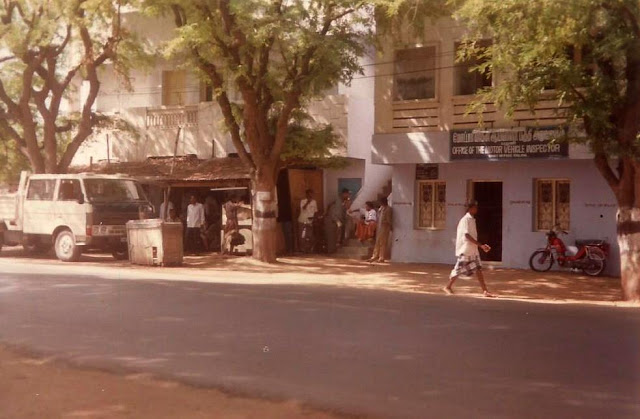 |
| The Mazda parked outside the Motor Vehicle Inspector’s office in
Palani before the shenanigans began. I
was the first to arrive for the inspection & fitness certificate |
“I am a government officer so I don’t do anything else but my wife cooks food for many people coming to this office.”
That gave me an idea.
“Does she cook non-vegetarian food?”
He nodded. Taking out fifty rupees, I offered it to him telling him I wanted an entire chicken with gravy wrapped in foil. He took the money and was off in the instant. He returned half-an-hour later with the chicken. It was hot so I put it on the table. Overwhelmed with the fifty rupees I had given him, he asked if he should open the foil, urging me to eat before the chicken turned cold. I told him I wasn’t hungry as yet and would wait till my appetite returned. He frowned but went about his business.
At 3:30 the Inspector returned. He was followed by a horde of people who pushed themselves in front of the chair and began thrusting papers and documents at him. I got up and my chair was taken immediately. Pushing my way to the desk, I sat on it.
This didn’t please the officer. Consternation creased the lines of white, saffron and green, painted across his forehead. Indicating he wanted me off the table, he resorted to a series of clucks, waving his hand dismissively the while.
Instead, I opened the foil and ripped off a leg of chicken from the main body of the bird. Some gravy splattered and, in the immediate silence, the officer looked dumbfounded. Finding his voice, as I began to chew on the chicken, he spluttered in Tamil. I understood every word but pretended I didn’t speak the language. Frustrated he broke into English.
“You cannot sit on table. You cannot eat here.” He said with belligerence.
“I saw you eating bondas and drinking coffee before lunch. You didn’t offer me any and I am hungry. I was the first person to come to the office and have been waiting since 9:30 am!” I retorted with equal ferocity, taking another bite off the dripping chicken leg.
Completely nonplussed he said I could not eat meat in this office. “I am vegetarian and you are eating meat in front of me.”
“It’s a free country. You eat what you want and I’ll eat what I want.” I retorted.
At a complete loss for words, amid looks of amusement from the gathering in front of his desk, he said, “Come, I will inspect your vehicle now.”
I said I was not ready, stating I would first finish my lunch. This left him in a state of acute embarrassment and he decided to turn to the next person. All of a sudden, nobody seemed to be in any hurry. They were intently observing someone taking the mickey out of this corrupt department and wanted to witness it to its conclusion. The officer turned and forcibly took a document from someone’s hand. Proceeding to mutter under his breath, he quickly finished with him.
There was a gasp of astonishment from the onlookers. He had not asked for any bribe, which had been going on openly before lunch! Hastily, people started thrusting papers in front of him and he despatched them as quickly. Hanging around outside the office, their business completed, nobody was ready to leave the premises. When I finally finished the entire chicken with a supreme effort, someone whispered, “Thank you sir. Can you please wait until I finish? He is not taking bribe in your presence.”
Stepping out of the office the Brake Inspector demanded to know which vehicle was mine. Nobody had left and there were scores of vehicles still lining the road outside. My one-year old Mazda, just serviced in Coimbatore and gleaming in the evening light, stood right in front of him. A large crowd, waiting gleefully to see what would happen next, surrounded the vehicle.
Not knowing what to do, he gave me the registration documents and got under the vehicle to examine the chassis number. Having verified that, he asked if I had changed the engine. I told him I had.
“What?” he screamed, lying on his back under the vehicle. “What engine have you put?”
“I have put in a Rolls Royce engine,” I replied nonchalantly.
“You cannot change engine without informing this office.”
“I have just changed it and am informing you, in accordance with the rules.” I really had no idea about the rules!v
“How is the old engine number and this number the same?”
“I don’t know. You will have to ask Swaraj Mazda and Rolls Royce.”
By this time the Bus drivers Association, the Lorry drivers Association, along with the commercial owners Association, were doing everything possible not to roll on the ground with unbridled laughter. A brigade of private car owners, with their vehicles already certified, were reluctant to leave and a swelling crowd of bystanders was blocking the road by then.
People trying to get to Dindigul from one end and Batlagundu from the other, now left their vehicles in the middle of the thoroughfare on either side. More onlookers joined the crowd and, as though by magic, tea, coffee, sweetmeat and bonda vendors appeared, adding to the carnival atmosphere.
Realising that he wasn’t going to get much joy from delaying the proceedings, the officer got out from under the vehicle. A huge blob of diesel smeared his face. Not amused, he said he would sign the inspection certificate immediately.
“You have to try the vehicle,” I reminded him. “If there is a brake failure or any other mechanical misfunction, you will be liable!”
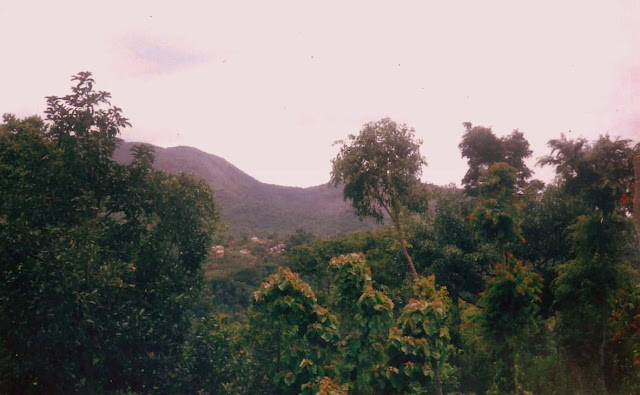 |
| The view from Khoram Estate |
He really wanted to disappear by then. In no mood to argue, he got behind the steering wheel and asked me to get in. Sitting next to him in the passenger seat, I watched him fumble and helpfully instructed him how to start. It was obvious he had never driven anything this size and falteringly moved through the mysterious gap, which suddenly appeared in the midst of what was, perhaps, Palani’s entire population. I insisted he drive for a kilometre, reverse without my help and drive back to the office.
He signed the certificate then, instructing me to never come back. He would come to Kodaikanal instead and do the needful. I told him that wouldn’t do. I would be back for the annual inspection. That October he sent me a box of delicious Indian sweets as a gift for the Puja holiday. These are some of the hi-jinks that are a prerogative of a propitiatory planter!
But I am getting ahead of myself. I had already purchased my Estate and named it Khoram, after my in-laws, Behram and Khorshed. Then, the following year, I purchased the prized property, on the opposite side of the river. We named it Avenbi, which are the first two initials of our immediate family, adding those of an aunt and uncle who looked after my wife when she was a schoolgirl in Bombay.
It had been a long, tough road. It was like nothing I had experienced working in the corporate sector. I couldn’t do everything I wanted to at once, and had my work cut out just looking after the four acres in the middle of the estate. Staying on the property without electricity wasn’t the least of it. I couldn’t afford a toilet for two years! Bathing in cold water in a nearby stream, performing my ablutions out in the open, while it was still dark; using a manvetti to dig a daily makeshift commode … needless to say there was no telephone either.
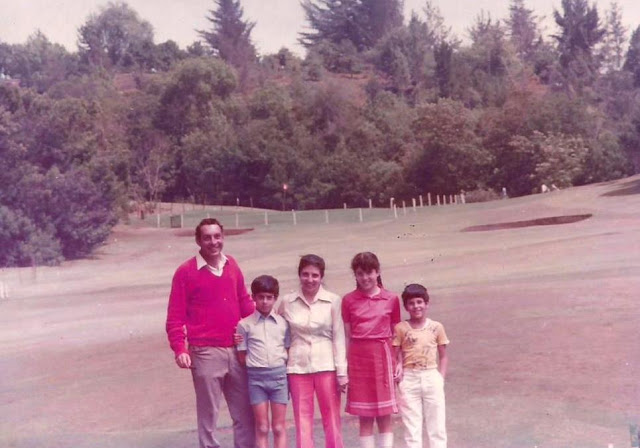 |
| Family outing at the Golf Course in
Kodaikanal |
The comforts of home in Kodaikanal beckoned. Walking back and forth, to catch the bus at Perumalmalai every three or four days, became routine. Never having learned to cook, my staple diet was Maggi Noodles interspersed with MTR packets of ready-made bisibele bhat (rice), to which I added the company’s other products. Not exactly gourmet meals, it was convenient. All I had to do was add the sealed foil bags to boiling water and wait for a few minutes, before devouring the concoction ravenously.
I worked from ‘can-see-to-can’t-see’ and, at the end of each day, dragged my weary carcass, unenthusiastically, to the nearby stream for a bath in cold mountain water. This got particularly exhilarating if it was raining! Sleeping early, I would get up between eleven and midnight to do a round of the estate, equipped with a torch and shotgun. Waking again to take in the sunrise with a hot cup of tea, I would once again prowl the upper reaches of the estate to chase destructive monkeys away.
At times a few rounds from the shotgun acted as disincentive; when as many as two hundred bonnet monkeys leapt from the trees and raced away, to return roughly a fortnight later. It was an ongoing battle to protect my crops. I often wondered how long I could keep up with this pace. It was a brutal existence but, the pleasure of owning my own property kept me going and I was happy with everything I was able to achieve.
 |
| The irrigation tank at the
top of the estate, half full. It was an enormous tank and the life blood of the estate. The well that was supposed to always hold
water was empty a few months after I purchased the property and led to this
huge engineering project. |
Help though was around the corner. Out of the blue, Shehzarin got a job with the Kodaikanal International School, which effectively took care of the children’s education. Shortly after, one of my colleagues from the Corporation appeared and spent the night with me. He had been asked by the boss to find out how I was doing. He must have painted a pretty grim picture because, a few days later, one of the company staff rode down on a Jawa motorcycle. He had a letter for me from the Mudis Group engineer.
“This bike is for you for a thousand rupees and is payable when able.”
That felt mighty good. I was now mobile. At about that time, several Sri Lankan labour who fled to India, were given land in Pethuparai and the village grew exponentially. They were looking for work and I had plenty to offer by then. One of the older women working in the fields, said she would cook for me. Using a broken-down room adjoining the house, she started producing delicious native meals.
When I thought it couldn’t get any better, Thangamuthu Chettiar, the former owner, arrived at my doorstep. I hadn’t seen him since he sold the property a year and a half ago. Looking around proprietorially; hamming an attempt at pity, he said he would take the oranges on contract.
Offering twenty thousand rupees, as a special concession, he said he would begin the harvest within two weeks and offered a thousand rupees as advance. I didn’t know much about oranges but realised they had benefited from the fertiliser and sprays applied to the coffee. What he didn’t know was, I was still acutely aware that he had thrown a grand party in the village, after selling the property to me. He had made it a point to tell everyone there that I was an idiot to have paid so much.
Our initial agreement for purchase of his estate was seventy-five thousand rupees. By the time I resigned from the Corporation, I came armed with one lakh of rupees – by way of gratuity and provident fund. He made a fuss, insisting on one lakh. There was no way I could give him that much: it was all I had! After dickering for a day or two, he came down to ninety thousand.
Without a job, anxious to get on with my life, I agreed. Now he wanted me to let him have my oranges. I declined. Sighing heavily, he raised his bid to twenty-one thousand and offered a two-thousand-rupee advance. Seeing that he wasn’t making any impression, he went higher and offered an even bigger advance. When I still shook my head, he asked how much I wanted. Not wanting to spare his feelings I said I would let it got for a lakh of rupees. He was taken aback:
“I sold the property for ninety thousand and now you want a lakh only for the oranges!”
When I shook my head in the affirmative, he walked away muttering threats and curses under his breath. Well, I harvested the fruit myself and was surprised at the outcome. I made two lakhs after all expenses were deducted! The coffee plants didn’t yield much that year, though I did get a little over a tonne of parchment from across the river on Avenbi. The pepper vines were still growing and, when they came to bearing, made a huge difference.
At about this time our rutted road came under the rural development scheme. Supervised personally by a few new landowners, who had come into the valley by then, it became a beautifully laid tarmac stretch all the way to the river. With that came the plantation inspector! I was walking down to Khoram when a jeep slowed down. It was going in the same direction and I thought I might be offered a lift. However, the person seated next to the driver, waved him on. I noticed it was a government jeep and found it waiting for me by my estate gate.
“I am the plantation inspector. I request your permission to visit your estate, which I have heard about.”
Naturally, he had every right to visit and I invited him in for a cup of coffee. We walked through the property, from top to bottom, inspecting the backbreaking work in progress on the top section. We had made drains, fifteen feet deep and ten feet wide along the contours, covering the breadth of the property. Over a dozen workers were busily pushing the numerous rocks and boulders into these trenches. At the same time contractors were digging a water storage tank which would gravity feed water to the coffee pulping unit six hundred feet below. Later this would also be used as a swimming pool!
“I’m doing this because the bottom section is already planted and we can’t roll these enormous rocks down the hill. They will damage the plantation below.”
He nodded and seemed to appreciate the work being done. After his inspection I walked him to the gate where his jeep was waiting. It was coming toward the lunch hour and I fancied another cup of coffee, when a worker came rushing up to tell me the plantation inspector, standing on the road, was inciting workers to strike and demand more pay. He also told the workman he wanted five hundred rupees from me every month ….
I was already paying more than the government prescribed, and much more than the Planter’s Association of Tamil Nadu had negotiated with the unions. Furious at his double standards, I grabbed my shotgun and rushed to the gate. He was in full flow, telling the workers they weren’t being paid enough and he was going to take action against me. I didn’t say a word but opened the bonnet of his jeep – it gave him pause in the midst of his premeditated oration. Watching intently, his jaw dropped when I removed the radiator cap and flung it into the bushes.
Still fuming I opened his distributor cap and pulled out the rotor. I flung this in a different direction and proceeded to deflate one of the front tyres. Stunned, he offered no protest. When the tyre was almost flat, I straightened from my task and told him to start running. I pointed my gun at him but that seemed to have no impact. He stood frozen and only the sudden quiver of his mouth betrayed his state of anxiety. Firing at the ground between us, the blast had the desired effect.
He turned and started walking quickly up the hill. The workers clapped and laughed and I thought I would provide them some more amusement. Using the second barrel, I fired again, this time a mite nearer his heels and he started running. Chasing him and reloading the while, I let him have both barrels this time. He was off like a jackrabbit, with a turn of speed that would have left Hussain Bolt still kneeling at the starting blocks!
The jeep was towed away the next day. I never did get to see that amazing athlete again, though I was told he was inciting workers on other nearby plantations. That was enough to get us together and it was the start of our Farmer’s Association. It flourishes till today. Under M.S. Francis, who was the founder President, we went on to tackle the toll-gate issue. Peasant farmers had to pay toll to go into town to purchase their daily requirements: it included access to the post office and police station. They had to pay even to fill petrol, as the petrol bunk was on the other side of the tollgate.
Numerous visits to the land record (Taluk) office was another case in point. The government slogan in place at the time was – “Come tomorrow!”
The Coffee Board was another pain. All coffee growers had to collect TP3 forms from the Central Excise office in distant Pannaikadu: without these forms no coffee could be taken out from the estate premises. It was a mandatory exercise, in collaboration with the Coffee Board, to ensure all coffee was necessarily supplied to the Board. To add to our woes, the officer in-charge, at Perumalmalai, was an unmitigated rascal. His only function was to weigh coffee sacks on his rigged weighing scale; deducting three to four kilograms, from each forty-kilogram sack. On top of this payments to growers were staggered. The last of these instalments coming as late as six years after supply.
We were able to take down this odious monopoly imposed by the Coffee Board and it allowed us to sell our coffee to whomever we pleased. I paid for the bike soon enough and went on to buy a Land Rover. When that became insufficient, I attached a second-hand trailer but, when even that no longer sufficed, I purchased the three and a half tonne, double cabin, Swaraj Mazda.
The Mazda had been flown out of Japan as a demonstration vehicle. It was exhibited in Coonoor, over the weeklong seminar of the United Planter’s Association of Southern India, culminating with their Annual General Meeting. A lot of haggling went on but, my late friend, W.P.A.R. Nagarajan, had the last word and I got it for two lakhs. It was the first Light Commercial Vehicle in the country. He insisted on accompanying me back to Kodaikanal in the lorry but, by the time we got to Mettupalyam in the plains, he decided to give his aching backside a break and transferred it to his car which was following.
I managed well enough on my own but it really was like riding a bucking bronco. Equipped with double springs in the rear, with no cargo as ballast, the slightest bump turned the scene into something out of the Wild West. Gritting my teeth, I got her back to Kodaikanal in one piece but wasn’t quite sure if, in the bargain, I wasn’t broken in half! We removed the upper backup springs (all made in Japan) and, with sufficient cargo by way of sandbags, when there was nothing else to transport, it made for a smooth ride.
There was a problem with registration. The Regional Transport Officer had never registered such a vehicle before and was completely flummoxed. Again, as a commercial vehicle, the cost of operating the Mazda would have been prohibitive. I was somehow able to wrestle an endue certificate from the then sub-collector of Dindigul, posted in Kodaikanal, which exempted me from all taxes: I had only to pay one hundred rupees for the fitness certificate each year. It was cheaper than owning a car! She served me well for twelve years and, at the end of which, I got the same amount of money I paid for her.
In the final analysis, the estates taught me to deal with government departments: to drive the lorry hundreds of kilometres to purchase fertiliser and equipment and, to combine these trips with taking produce to market whenever possible. Gruelling as it was, I quickly learned how to do everything myself out of necessity. I understood the need to work alongside the labour, getting to know each and every one of them, including their families and their problems.
For over a quarter of a century, both Khoram and Avenbi taught me to be sensitive and responsible – to never back down, and do the right thing in the face of often intractable odds!
Some more photographs from Minoo Avari's collection:
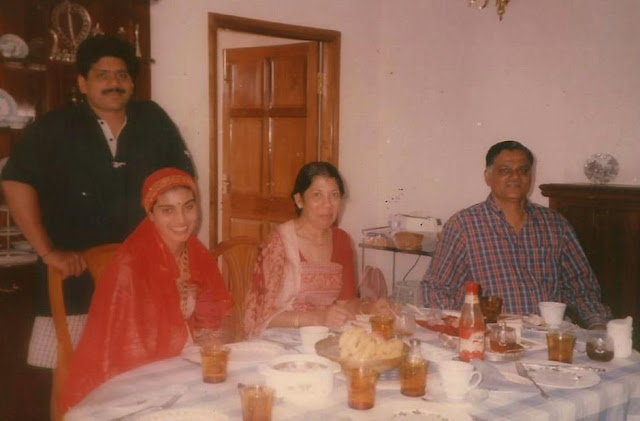 |
| Late Eric Karumbaya (Engineer on
Mudis Group – BBTC) with his late wife Tara and son Naveen along with Rakhyee,
Naveen’s wife, during Naveen’s wedding in Coorg. I represented Eric and had to go to Mysore to
fetch the wife-to-be attired in complete Coorg attire – known as a Kupsa. |
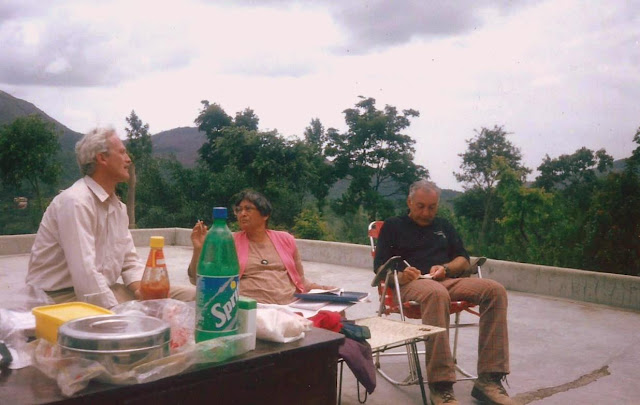 |
| The Mya Palanimalai Farmers Association – Meeting atop the new godown
I built on Khoram. Photo of Victor
Vigour from Iceland, Peggy Rustomjee and Yours Truly doing the minutes. |
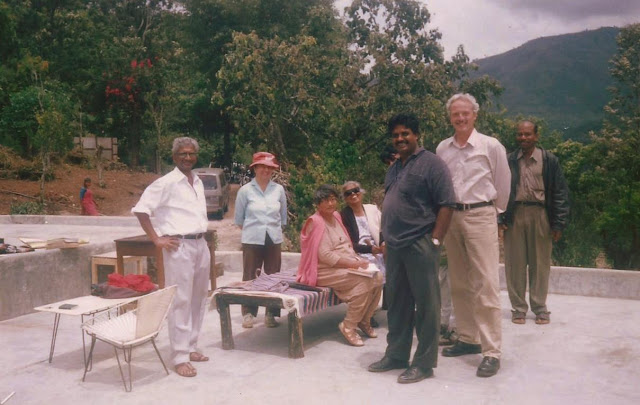 |
| The Mya Palanimalai Farmers Association (MPFA) has members from India, the U.S, Iceland, New Zealand and Sri Lanka |
Here is the link to Part I of this story -
https://teastorytellers.blogspot.com/2019/09/travails-of-would-be-proprietary-planter.html
Meet the Writer: Minoo Avari
 |
| Minoo riding bareback in Ging, Darjeeling |
In his own words: I was born in
Calcutta on November the 26th 1945 though we were a Darjeeling based
family. I studied at North Point (St. Josephs College - Darjeeling) and
then went on to do my College in St. Xavier's College, Calcutta. I
played a lot of tennis at this point, travelling around the country
playing in just about all the tournaments then.
Later I joined the tea plantations
in Darjeeling and was on Ging and Tukdah Tea Estates till 1970 when I
switched companies and joined The Bombay Burmah Trading Corporation. I
had got married earlier in the year and my wife and I were posted to
Oothu Estate in Tirunelvelli District of Tamil Nadu.
Now I lead a retired life - writing, playing tennis and enjoying riding
my motorcycle. I am currently the President of the local Farmers
Association and also the United Citizens Council of Kodaikanal. I am
also a member of the London Tea History Association.
Read more by Minoo Avari here: https://teastorytellers.blogspot.com/search/label/Minoo%20Avari
Is this your first visit here? Welcome to Indian Chai Stories!
You will meet many storytellers here, and they are almost all from
the world of tea gardens: planters, memsaabs, baby and baba log. Each
of our contributors has a really good story to tell - don't lose any
time before you start reading them!
My name is Gowri Mohanakrishnan
and I'm a tea planter's wife. I started this blog because one of the
things that I wouldn't want us to lose in a fast changing world is the
tea story - a story always told with great seriousness, no matter how
funny - always true( always ), maybe a tall tale, or long, short,
impossible, scary, funny or exciting but never dull.
Do you have a chai story of your own to share?
Send it to me here, please : indianchaistories@gmail.com.
Happy reading! Cheers to the spirit of Indian Tea!


-420x546.jpg)



